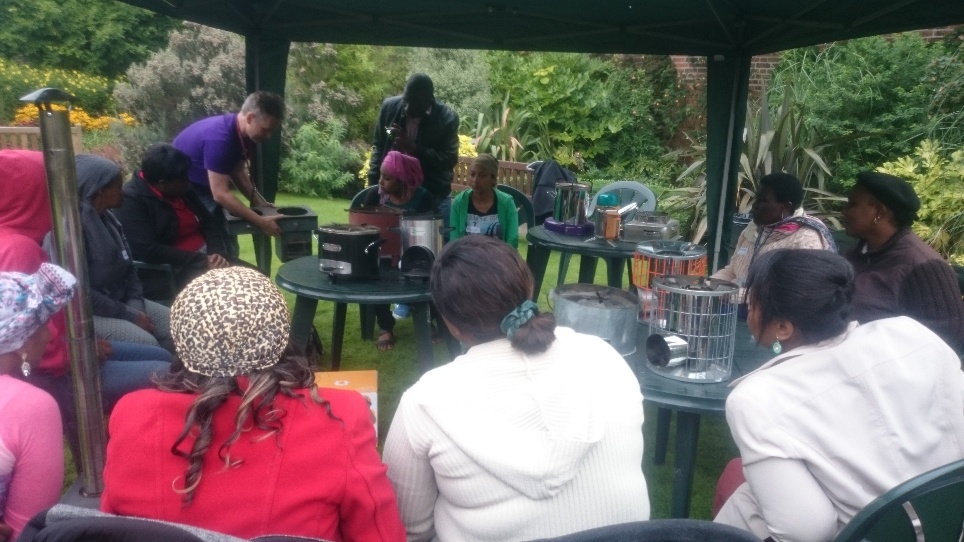
The University of Nottingham team up with the Women’s Cultural Exchange (part of the Nottingham Refugee Forum) for a bake-off event.
On Monday 14th September 2015, the University of Nottingham hosted the Great African Bake-Off where academics, policy makers and practitioners were invited to observe volunteers from the Women’s Cultural Exchange cook delicious food from a range of Sub-Saharan African countries (including Nigeria, Eritrea, Sudan, and Malawi) on a variety of Improved Cookstoves.
The event was designed to complement the USES Barriers project, which seeks to understand the barriers to the introduction and uptake of Improved Cookstoves (ICS). ICS (pictured) are designed to burn biomass fuels more efficiently and have been promoted by a range of governments, charities and international organisations since the 1940s. Despite these interventions however, the uptake and sustained use of these stoves has been slow. Reasons for failure include cost, cultural resistance to change, access and availability of fuel and the failure to understand users’ needs.

The Nottingham team (consisting of Dr Charlotte Ray, Dr Mike Clifford and Dr Sarah Jewitt) wanted to further explore this idea that some ICS fail to meet end-user requirements and the bake-off was an opportunity to receive end-user feedback on existing ICS technologies in the market place, better understand what criteria end-users have when it comes to choosing a new cooking technology and observe how users interact with the stoves and how that could impact on adoption and sustained use.

In addition, the event was an opportunity to encourage guests to interact with both the technology and end-users in order to explore user preferences, performance, safety and wider cultural (especially gender) considerations surrounding energy/fuel choice.
.jpg)
Victoria Mponda, one of the cooking volunteers and coordinator of the Women’s Cultural Exchange said of the event: “The opportunity given to us by the University of Nottingham to showcase our cooking skills was more than we could have imagined. We are always looking for opportunities to show people just how amazing our women are, to remove the stigma that is associated with our background. These are the moments that I love because it is through them that I notice the leaps and growth within the women. Being given a chance to interact with the wider community removes all the barriers they face or imagine, these moments gives us a larger hope for our future from the limbo that we face. It was home, safe and made everyone in the group very happy to be part of it”.
DfID also said of the event: “The event was a positive and interactive platform to demonstrate the cookstove technology being used [as part of] the Barriers project. There was an atmosphere of collective learning and I engaged in interesting conversations with other participants and cookstove users. These conversations offered necessary insight into the usability of the technology and added a valuable, real dimension to the research being carried out”.
As part of the dissemination process for the Barriers project, the Nottingham team will discuss the bake-off as part of an upcoming conference paper at the GACC Clean Cooking Forum due to take place in Accra, Ghana in November 2015. In addition, they are in the process of organising a similar ‘Cook-Off’ event as part of the Cleaner Cooking Camp that is held in Malawi each year. It is hoped that the volunteers for this event will be participants that undertook household questionnaires in urban, rural and peri-urban communities as part of Barriers data collection. This event will take place in March 2016. More will follow.
The Women's Cultural Exchange is a local voluntary community group in Nottingham that supports the development and empowerment of women from a refugee and asylum background. The group supports and enables women to address multiple stress factors and remove the significant isolation they experience in the uncertainty of the asylum process and also adjusting to life in the UK. The group has members from over 30 countries from around the world, and is based in St Ann’s at the Sycamore community centre where the Nottingham Refugee Forum offer them a premises for their weekly meetings and a place to hold most of their activities. For more information contact: womenscultureexchange@gmail.com; Facebook Page: WCE NOTTS.
